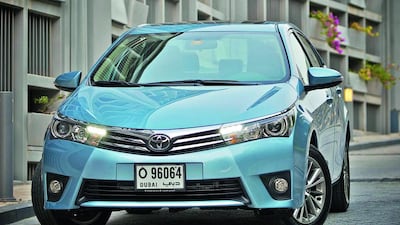Do you have any idea what the world’s biggest-selling hairdryer is? No? OK, how about microwave oven, television or steam iron? Still struggling? Someone must know the answers to these questions, no matter how uninteresting they might be, but how about the world’s biggest-selling car? That’s easy: with sales of more than 40 million units since its inception 48 years ago, you’re looking right at it – the automotive equivalent of white goods.
It’s astonishing just how much excitement surrounds cars like the Toyota Corolla. I had always assumed they were bought by people who had no real interest in anything to do with cars; that buying one was akin to buying a fridge-freezer or a water dispenser. So long as it does the job, who cares? Right?
Wrong. The Corolla is evidently a car that people get very passionate about, entering heated online debates to champion against its perceived rivals from Japan and South Korea. But, as a fan of driving, I just don’t get it. So, during my few days with the “all-new” Corolla, I ask friends and family what they think of it.
Most give the exterior design a thumbs-up and, indeed, it’s a more grown-up-looking car than ever before. It looks like a Camry that’s been shrunk in the wash, and is quite smart, although Kia and Hyundai both operate with a design language that immediately makes it look old-fashioned. But it’s a step in the right direction, at least. And that continues with the interior, with a pleasing dashboard design that again emulates its bigger brother, although the materials are cheaper and hard, and the seats, on anything longer than a half-hour journey, reveal themselves as being far too firm on the posterior for driver and passengers alike.
Toyota is calling this an all-new car, but the truth of the matter is that underneath its bodywork is an old model in desperate need of modernisation. The gearbox is an old four-speed automatic, but it’s less grating on the nerves than those wretched CVTs, and the engines (1.4L and 2.0L four-pots) aren’t powerful enough to mix custard with. To get any forward movement whatsoever you need to get your foot flat on the floor and leave it there.
In so doing, you accidentally discover that the Corolla is pretty good at gluing itself to the road. Approaching a deserted roundabout in Dubai, carrying more speed than it should have been because of the fact that I was just trying to keep it moving, it lurched and leaned but refused to relinquish its grip on the dusty tarmac. On the straight-ahead, the steering is overly light and I find myself having to constantly make minor corrections, a bit like B A Baracus used to when driving his A-Team van.
That four-speed ’box makes for rather high revs when cruising, too, so there’s always a bit of a thrashing racket coming from up front at speeds over 100kph, and the wind-noise insulation could only be described as average.
So is it all bad? No, perhaps I’m being harsh, but I can’t, no matter how hard I try, shake off the impression that the Corolla is just some car. A nondescript method of getting from point A to point B without breaking down. And therein lies the secret of the model’s incredible success.
Toyotas are built to go on and on and on. Just look at the fleets of taxis that operate, not only throughout the UAE but the rest of the world. If they break down, their operators lose lots of money, so it’s a decent barometer of longevity to see where they spend their money. And the majority of taxis that I’ve spent seat time in since being here have been Toyotas.
Does their success at providing reliable public transportation, though, mean they’re a decent purchase for us as consumers? Obviously that depends on what you want out of a car and, personally, I can’t think of many things more soul destroying than having to drive one of these things every day. Like I said, I love driving. But if I had to, I’d be able to live with one provided that the journeys made in it were mercifully short.
The Corolla’s millions of adoring fans might read this and think “so what? It does what it says on the tin”. And they’d be right, because it’s white goods and it lives up to that premise. But coming from the world’s biggest car company, I was expecting more from it – a game-changer that offered a new, far better experience for the masses that will end up with one in their possession. If Toyota could just make it more youthful in its appearance (like the version that US buyers will get), make it more appealing to buyers who like a bit of tech and give it a bit more punch, then it could possibly be a really good car, rather than merely an adequate one.
Follow us @LifeNationalUAE
Follow us on Facebook for discussions, entertainment, reviews, wellness and news.

